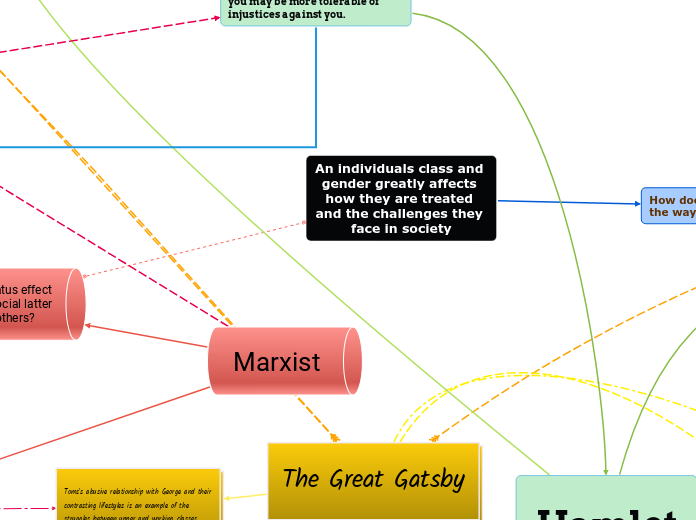Women are commonly objectified in Gatsby, for example how Gatsby pursues Daisy as a symbol of his own success and status, and not for Daisy herself.
Daisy Buchanan is a basic example of the shallow, stereotypical role of a passive, delicate, and impressionable woman.
Ophelia's character is an example of a submissive, weak female stereotype
Depending on your social class, you may be more tolerable of injustices against you.
Ophelia looking for a relationship with Hamlet shows she doesn't fully understand Hamlets responsibility to choose a suitable royale partner.
The working class man has taken enough form the bourgeoisie's oppression and has decided to retaliate and bring the Gatsby his consequences.
The marriages in the novel are often marked by inequality and lack of genuine connection. Tom and Daisy's marriage, for example, is strained and marked by infidelity.
Jordan Baker, is depicted as independent and assertive, challenging traditional notions of femininity. Jordans career path also showed her progressive architype, being a professional golfer, she has to face the challenges of being in such a male dominated environment.
Affirming Harmful Stereotypes
Hamlet's revenge can be analyzed in the context of toxic masculinity, where his desire for vengeance is tied to societal expectations of male honor.
Challenging Norms
Hamlet challenges traditional masculinity by being introspective, emotional, and vunreble. His famous soliloquies, such as "To be or not to be," delve into internal struggles and question the expectations placed on men.
these strereotypes portay, men are given all of the power and responsibilty while the woman are meerly objects to be fought over. Being a man in this world might mean you are given much more opportunity for success in your career or just more respect overall
Revenge And Justice
Hamlet's quest for revenge against Claudius is a response to the injustice and corruption within the dominant class.
The end of Gatsby is a perfect example of the working class man finally standing up for himself against the injustices brought down on him by those out of his reach. George had taken enough and the recent murder of his wife had pushed him to the point of murdering his late wife's assailant
Hamlet
The Great Gatsby
Gender Theory
Gender Roles
Marxist
An individuals class and gender greatly affects how they are treated and the challenges they face in society
How does one's gender affect the way they are respected?
How does economic status effect where they are on the social latter and how they treat others?
False Consciousness
Gatsby is somewhat blinded by the idea of the "American Dream". He believes that class division is not as strong as it seems. It is due to Gatsby's come-up story, where he has astoundingly crossed over the class bridge, that he is less inclined to realize the harsh realities of those who aren't as lucky as him to make it out. Since he does not see the division other do, Gatsby seems to have a much less serious tone when around others outclassing him, and appears welcoming to them.
Characters directly below the King and Queen (Hamlet, Ophelia & Polonius) may exhibit false consciousness by aligning themselves with the ruling elite without fully understanding the consequences of their actions.
Class Struggle
Hamlets family royal family represents both a social and economic hierarchy in Denmark, placing themselves above society and taking great power for themselves.
Royals also organize amongst themselves, to create a hierarchy impossible to climb to outsiders. They do this so they won't ever have to worry about being dethroned or losing power.
Because the royals hold all of the power in a kingdom they can easily exploit the the peasants of the kingdom and keep them form rising up. Due to the unlikelihood of any consequences for their actions, many royals treat those under them purely as servants or entertainers for their own amusement.
Toms's abusive relationship with George and their contrasting lifestyles is an example of the struggles between upper and working classes.
Because of Toms fortune, he posseses much greater power than a working class man such as George, and often uses money to get what he wants. Because of this Tom treats George with little respect, constantly reminding him of his social status and has an ongoing affair with his wife.









